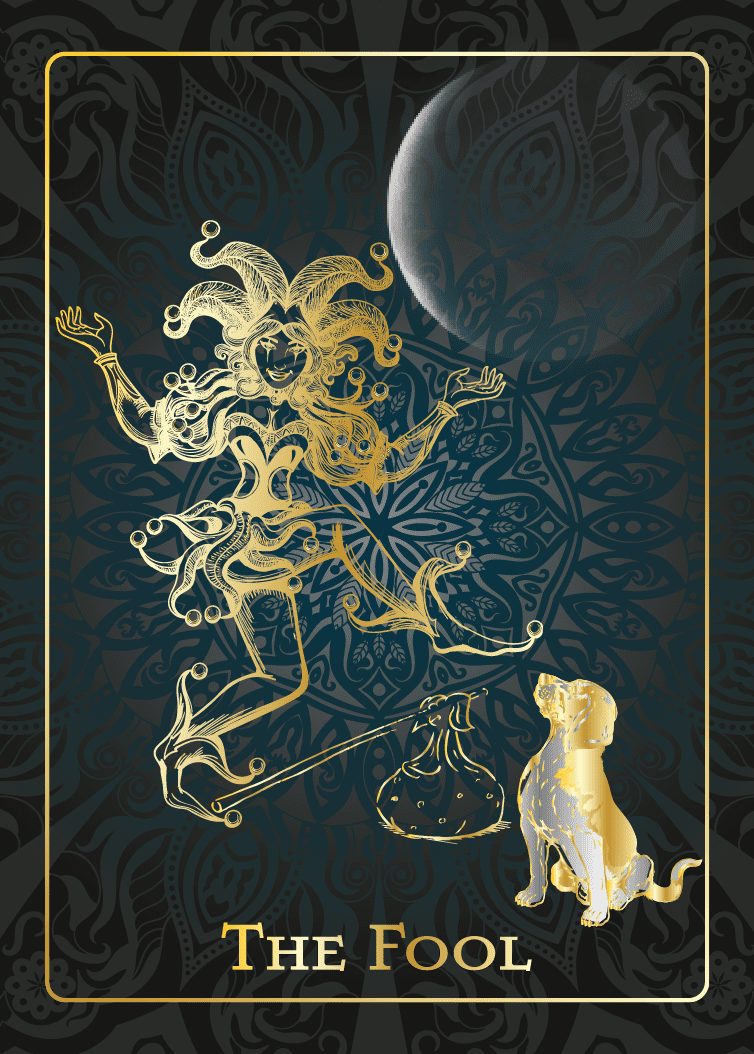
With all her worldly possessions in one small pack, the Fool begins a new journey under the auspices of the new moon. Where she will travel she knows not yet. So filled with visions, questions, wonder, and excitement is she, that she doesn’t see that she’s about to trip herself. At her feet, her small dog familiar looks on, (possibly he will warn her of her mis-step or catch her fall)
Will the Fool learn to pay attention to where she’s going before it’s too late?
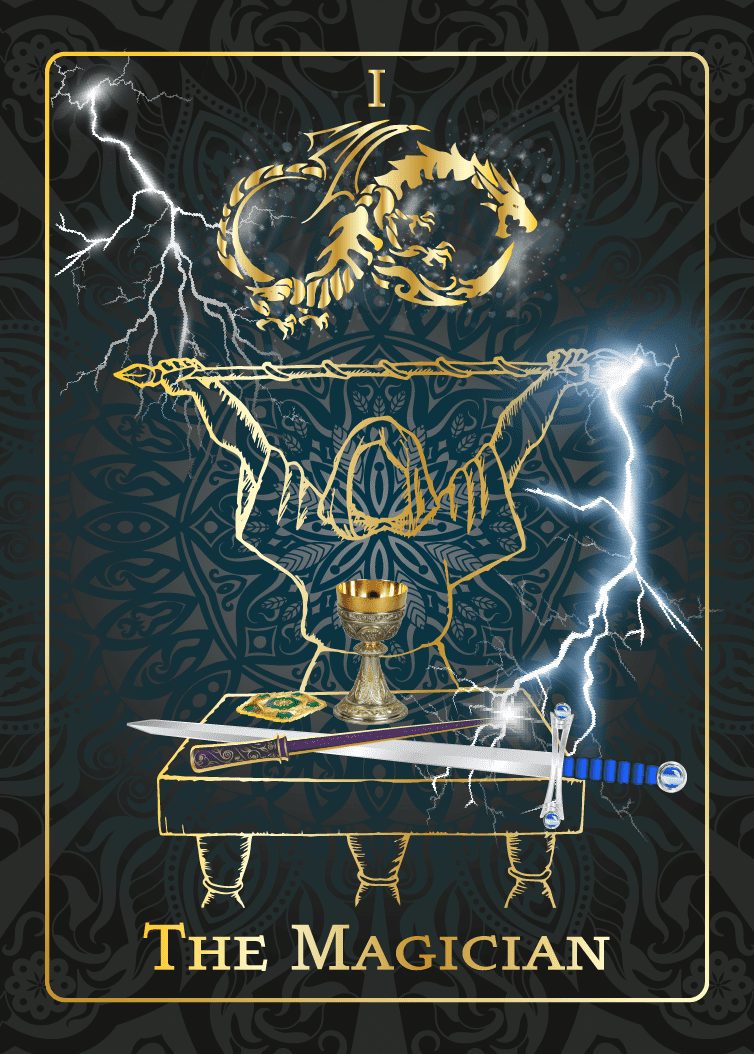
Traveling on her way, the Fool first encounters a Magician. Skillful, self-confident, a powerful magus with an infinite dragon halo floating above his head, the Magician mesmerizes the Fool. When asked, the Fool gives over her bundled pack and stick to the Magician. Raising his wand, the Magician calls on all powers. Magically, the cloth of the pack unfolds upon the table, revealing its contents.
To the Fool’s eyes, it is as if the Magician has created the future with a word. All the possibilities are laid out, all the directions she can take: The cool, airy Sword of intellect and communication, the fiery Wand of passions and ambition, the overflowing Chalice of love and emotions, the solid Pentacle of work, possessions, and body.
With these tools, the Fool can create anything, make anything of her life. But here’s the question, did the Magician create the tools, or were they already in the pack?
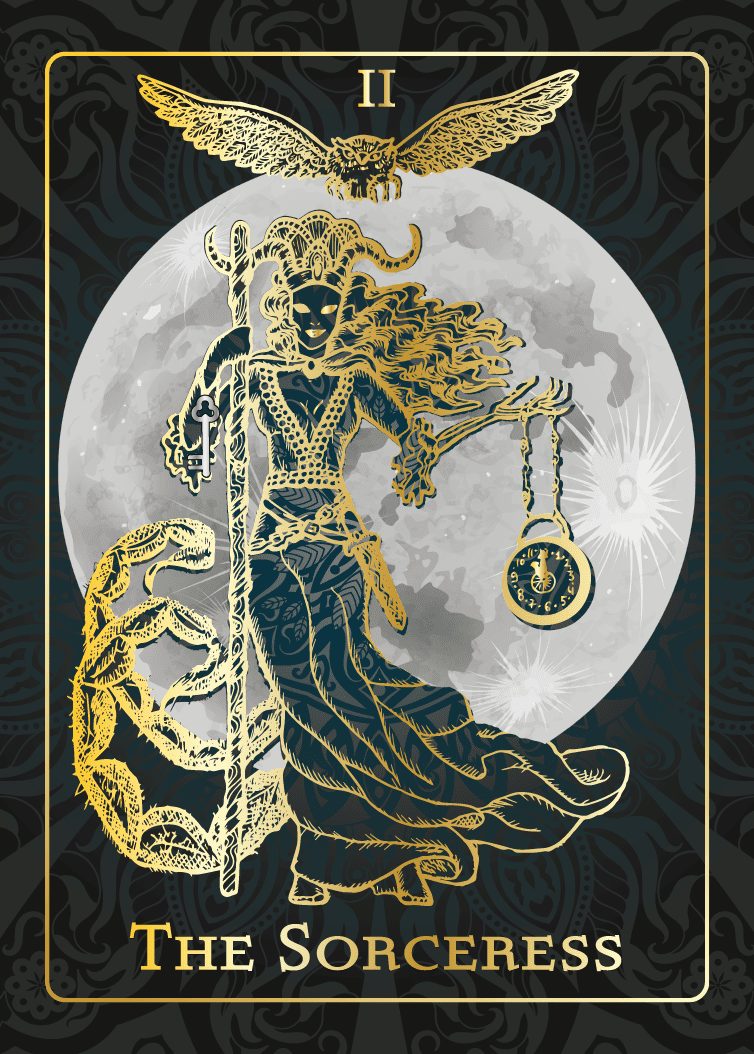
Continuing her journey, the Fool comes upon a The Sorceress illuminated by the moon. She seems to be the opposite of the Magician, quiet where he was loquacious, still where he was in motion, shrouded in the night where he was out in the bright of day. Sensing that she is a great seer, the Fool lays out her sword, chalice, staff, and pentacle before her. “The Magician showed me these, but now I’m in a quandary. There are so many things I could do with them. I can’t decide.”
The Sorceress doesn’t speak. On her wrist is a key to deep knowledge, she knows the answers. But also she knows words are wasted on others if spoken before one is ready to hear.
She invites the Fool to sit and put her decision-making on hold. The Sorceress does not pressure or rush the Fool, allowing the Fool time to recognize that there are seasons of life. The Fool learns to know the right time.
“I did not know any of this,” says the Fool. Studying to determine the season has given her insight into her new tools. “This information helps me to narrow things down, but I’m still afraid of making the wrong decision.”
The words come to the Fool then, not from without but from within: “What do your instincts tell you?” The Fool reflects on that, and that’s when she knows what she should do. Decision made, she rises to leave even though she suspects that the High Priestess has many more secrets to reveal. Right now, however, the Fool is focused and ready to be on her way.
Thanking the Sorceress, she heads off. But as she leaves she hears The Sorceress in her inner voice: “We’ll meet again…when you’re ready to travel the most secret path of all.”
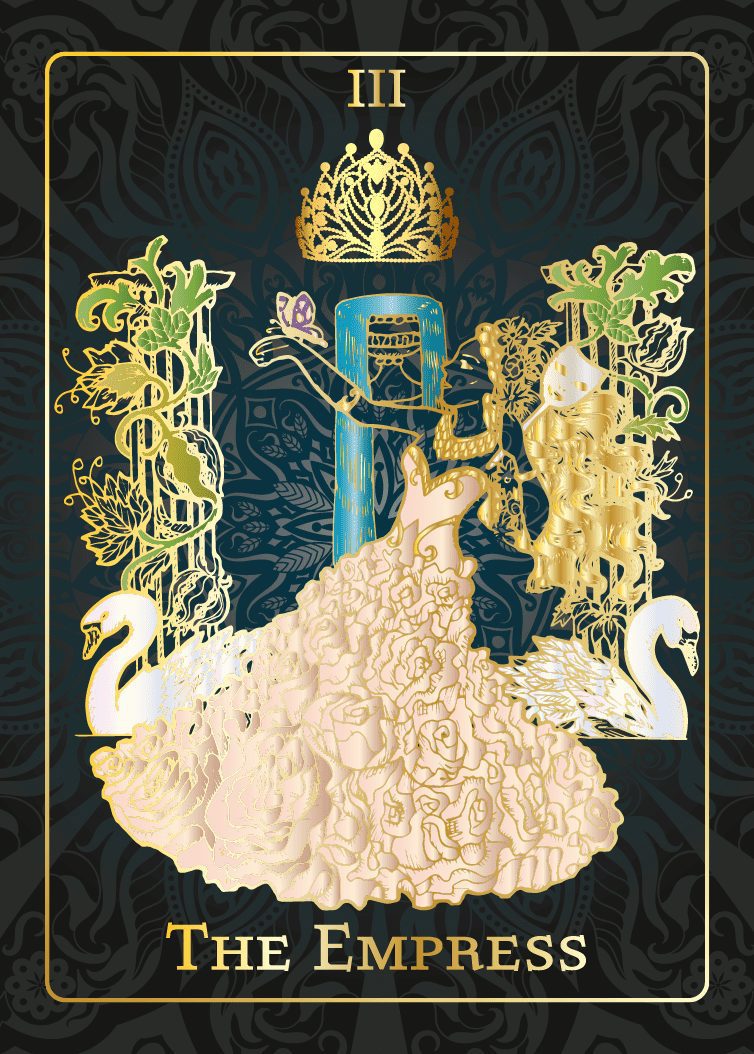
Having decided what she will create with her tools, the Fool strides forward, impatient to make her future a full-grown reality. This is when she comes upon the Empress. Her hair gold as wheat, wearing a crown of stars, and an elaborate gown of roses. She rests back on her throne surrounded by an abundance of grain and a lush garden. The Empress removes her mask to meet the Fool with her authentic face.
The Fool relates her story. And the Empress, in turn, smiles a motherly smile and gently gives her this advice: “Like newly planted grain or a newborn babe, a new life, a new relationship, a new creation is fragile. It requires patience and nurturing. It needs love and attention. Only this will bring it to fruition.” Understanding at last that her future will take time to develop, the Fool thanks the Empress and continues on her way.
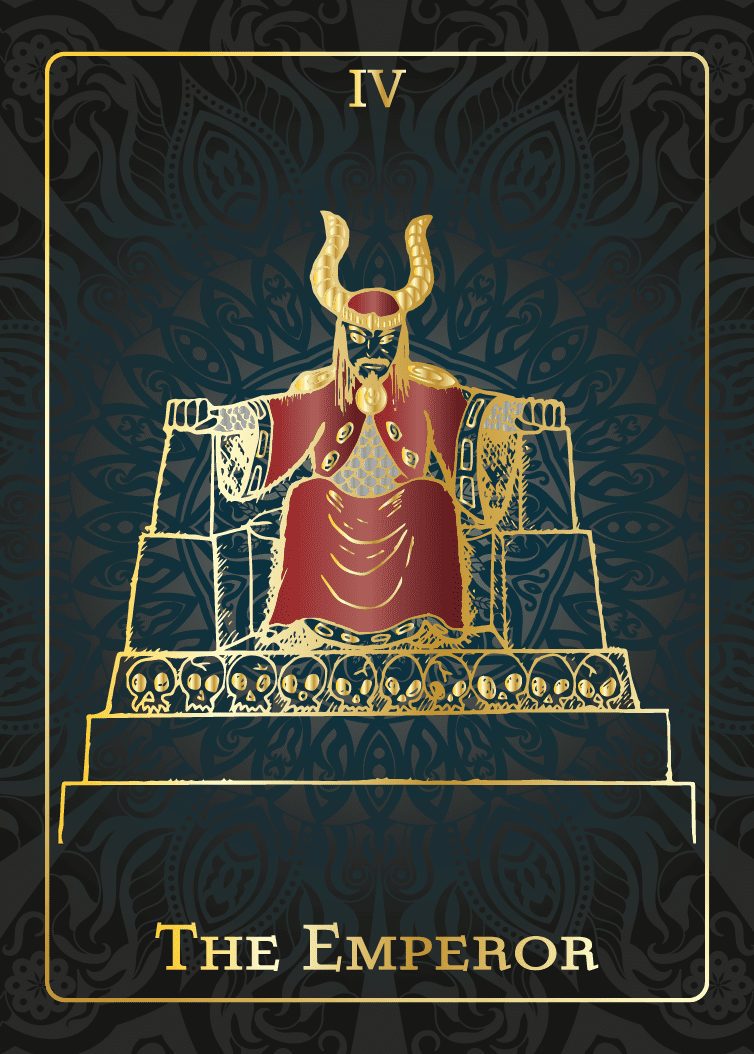
The Fool was given options by the Magician and decided on one with help from the High Priestess. She learned how to nurture her gifts thanks to the Empress. Now it has reached a stage where she must find a way to manage her own future. How to do this?
She approaches a great Emperor seated on a stone throne. The Fool is amazed by the way the Emperor is instantly, eagerly obeyed in every particular, at how well his Empire is run and organized.
Respectfully, she asks the Emperor how it is he does this. And the Emperor answers: “Strong will and a solid foundation of laws and order. It’s all very well,” he explains to the Fool, “to be imaginative, creative, instinctual, patient; but to control one must be alert, brave and aggressive.”
Ready now to lead and direct rather than be led, the Fool heads out with new purpose.
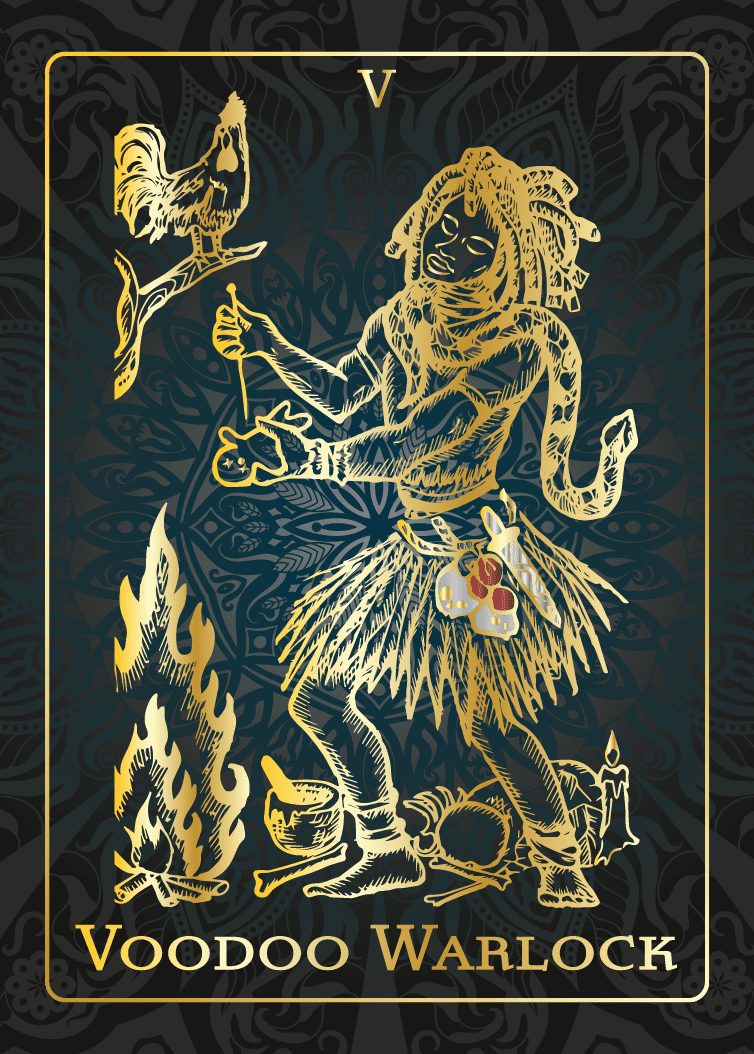
Having created a solid foundation on which to build her life, the Fool is struck with sudden fear. What if everything she’s worked for is taken away? Is stolen, or lost, or destroyed or vanishes? Or what if what she’s created so far isn’t good enough? In a panic, she heads into a temple where she finds the Voodoo Warlock; a wise and holy man. Petitioners kneel before the Warlock ready to hear and pass on his teachings. The Fool tells the Warlock her fears and asks how she can be free of them.
“There are two ways,” says the Warlock sagely, “Either give up that which you fear to lose so it no longer holds any power over you, or consider what you will still have if your fear comes to pass. After all,” the Warlock continues, “if you did lose all you’ve gathered, you would still keep the experience and knowledge that you’ve gained up to this point, wouldn’t you?”
“That is true,” the Fool says. “But what about the community, society, and friends I’ve discovered? More than knowledge or experience, I value them. If I lost all, I’d lose them too, wouldn’t I?”
“Not necessarily,” the Warlock answers with a knowing smile in his compassionate eyes. “If your community has traditions that you all share and beliefs, then you will never lose that fellowship even if circumstances force you to part. You can even pass such onto your children giving them the same fellowship with each other and with past generations.”
Hearing this, the Fool feels her heart ease, as if knots of fear have been loosened. A sense of peace blankets her and she takes a moment to thank the good Warlock most profoundly. Stepping out of the sanctuary she makes her way to a meeting with friends. Tonight they will talk about how they can create lessons and traditions to preserve not only their experience and knowledge, but their community.
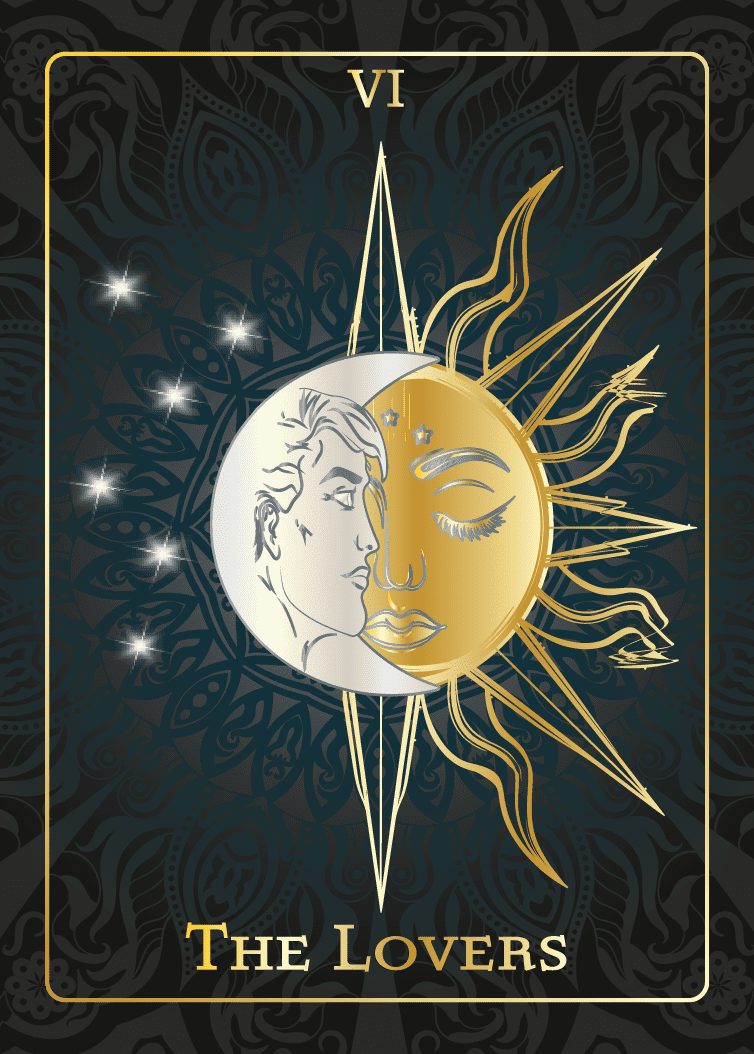
The Fool comes to a cross-road, filled with energy, confidence and purpose, knowing exactly where she wants to go and what she wants to do. But she comes to a dead stop. A flowering tree marks the path she wants to take, the one she’s been planning on taking. But leaning on the fruit tree marking the other path is an attractive man. The Fool has met and had relationships with women and men before, some far more alluring. But he is different. Seeing him, she has an inner knowing: “This is my other-self. A member of my star family, my soul family. He knows me and I know him”
When he speaks, he is her higher self; his words awaken her to remembering her true self.
That’s how shocking, how painful is her “recognition” of him. As she speaks with him, the feeling intensifies; like finding a missing part of herself. It is clear that he feels the same about her. They finish each other’s sentences, think the same thoughts. They clearly have had past incarnations and lives together.
Though it was her plan to follow the path of the flowering tree, and though it will be a change of her entire way of being to merge with her masculine self, the Fool knows she dare not leave him behind. No matter how divergent from her original intent, he has now become her moon and she has become his sun. She has integrated a previously missing part of herself; they are one. Together they head down a new road.
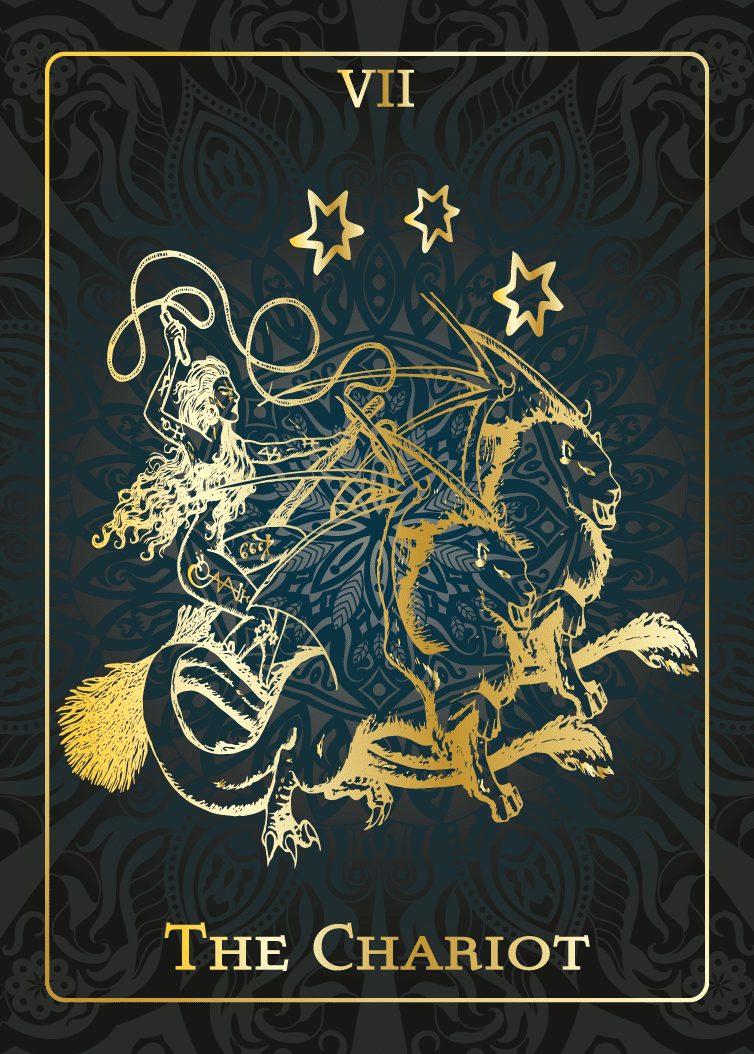
The Fool is close to completing what she set out to create long ago, back when the Magician revealed those tools to her. But enemies are now standing in her way, devious human enemies, bad circumstances, even confusion in her own mind. There’s no more forward momentum; she feels she is fighting just to stay where she is. Walking along the shore, watching the waves come in, she puzzles over how to defeat these enemies and get things moving forward once again.
It is here that she comes across a powerful Witch, with a golden Chariot. “You seem a victorious warrior,” the Fool calls out. “I feel beset by my enemies, unable to move forward. What should I do?”
“First, you must gather your strength,” the Witch pats her beasts who respond with a fierce roar. “Next, you must focus on your goal; where do you mean to go? What do you mean to do?” The Witch nods to her beasts: half lion and half dragon. “My beasts give the Chariot power, but it is my control and direction of them that gets them to their destination. Lion and Dragon, Dark and Light, they must be made to draw in harmony, under my guidance.” The Fool nods. That makes sense. “What if someone or something gets in my way?”
The Witch coolly meets the Fool’s gaze. “You run them down. Your aim is victory, and to be victorious you must have unwavering confidence in your cause. Never question, never doubt what you’re trying to achieve. Never lose your focus or motivation.”
The Fool is impressed and inspired. She thinks she now knows how to get past all the distractions and setbacks that have been keeping her trapped in place, like a riptide in the ocean. She thanks the Witch, but before she leaves, the Witch touches the Fool.
“One thing more you should keep in mind,” she says, “Victory is not the end, it is the beginning. Remember that before you decide to enter into any contest.”
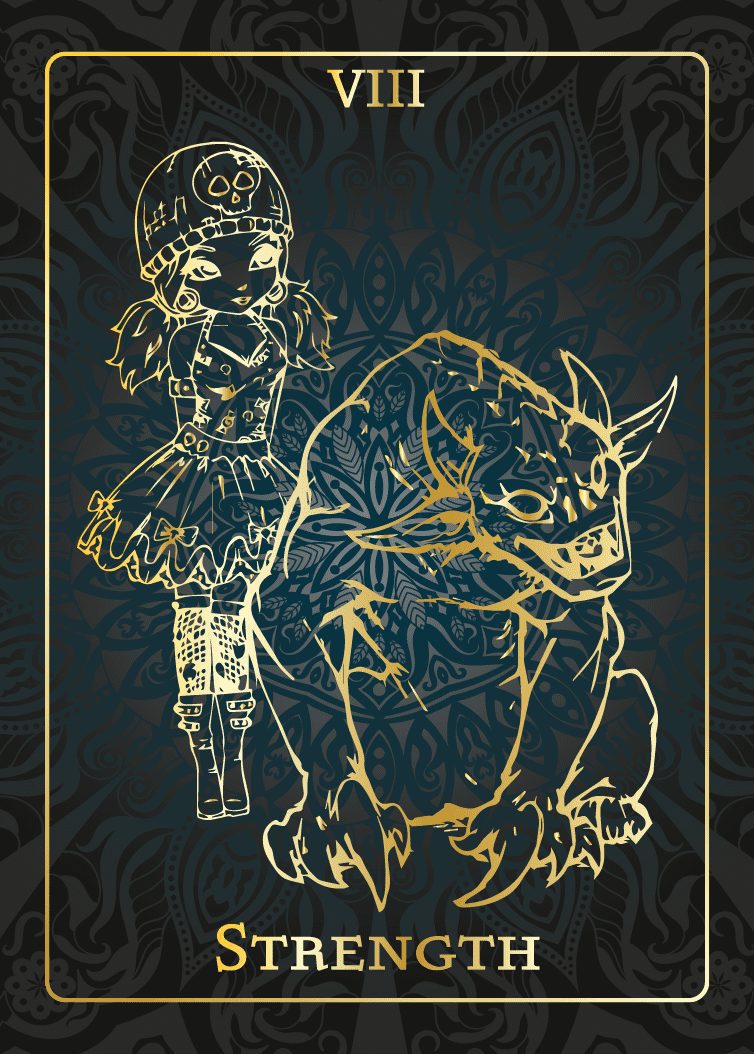
The Fool, victorious over her enemies, is feeling arrogant, powerful, even vengeful. There are hot passions in her, ones she finds herself unable and unwilling to control.
It is in this state that she comes across a girl struggling with a demon. Running to help, she arrives in time to see the girl gently but firmly shut the demon’s mouth! In fact, the beast, which seemed so wild and fierce, is now completely at her command.
Amazed, the Fool asks her, “How did you do that?” Affectionately patting the demon’s back, she answers, “I asked the demon to do it, and he did it.”
“But-but-” the Fool stutters, confounded. “Why did he want to obey?” At that moment, the girl looks kindly the Fool’s eyes; The Fool sees in her warmth, gentleness, a heart so great that its generosity seems as infinite as its willingness to understand. And that is when the Fool understands exactly why the demon did her bidding.
The demon wanted to connect to that higher energy.
Yet there is still one thing that confuses the Fool. “But,” she says, much softer now, “Why would you, sweet girl, want to keep company with a beast?”
“Because he, too, is filled with wonderful energy,” the Girl says. “It is wild and fierce, but it can be banked, like a fire in a hearth. I knew if he would take direction from me, we could both be warmed.”
“So, too,” she adds, “are our passions. Let them run wild and they will do damage. But we can, with gentle fortitude, check and direct those passions. In doing so, we can get so much more out of them. And yet, still, sate them.”
Her rage humbled, the enlightened Fool walks away knowing that it wasn’t only the demon that was tamed this day by a growing young girl’s pure and innocent strength.
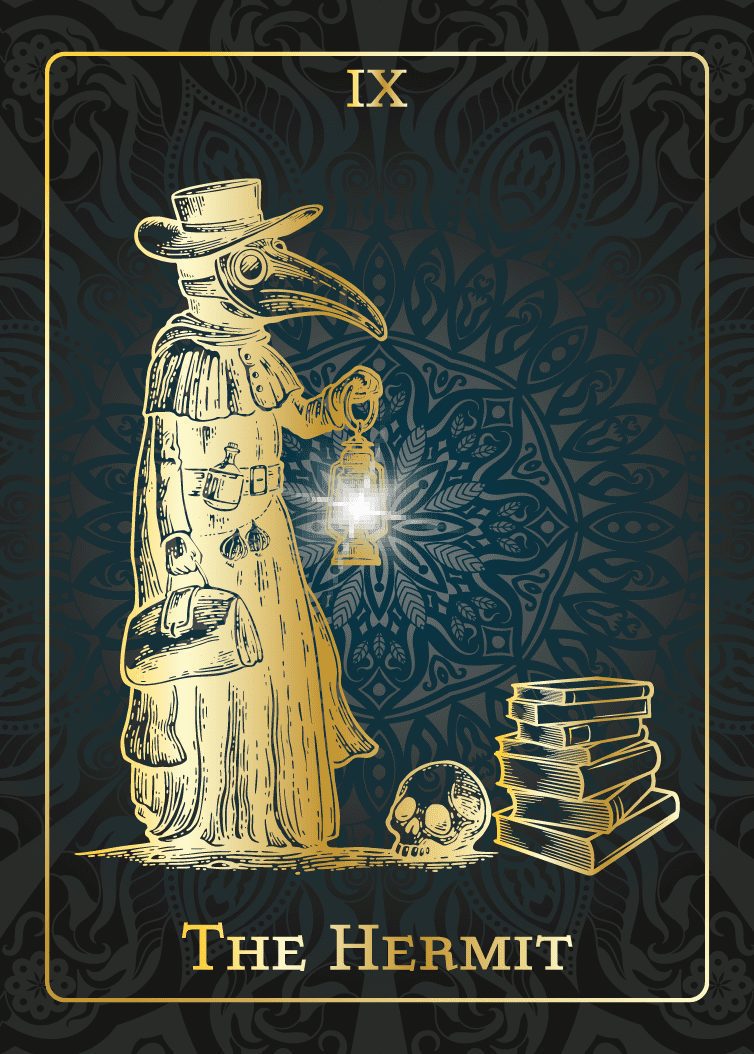
After a long and busy lifetime, building, creating, loving, hating, fighting, compromising, failing, succeeding, the Fool feels a profound need to retreat. In a small, rustic home deep in the woods, she hides, reading, cleaning, organizing, resting, or just thinking. But every night at dusk she heads out, traveling across the bare, autumnal landscape. She carries only her healer’s bag and a lantern.
It is during these restless walks from dusk till dawn, peering at and examining whatever takes her fancy, that she sees things she’s missed during her lifetime. Her lantern illuminates animals and insects that only come out at night, flowers and plants that only bloom by moon or starlight.
As these secret corners of the world are illuminated and explored by her, she feels that she is also illuminating hidden areas of her mind. In a way, she has become the Fool again. As in the beginning, she goes wherever inspiration leads her. Back then, however, her staff rested on his shoulder, carrying unseen her pack. The Fool was like the pack: wrapped up, unknown. The healer’s bag leans out beside her now, not behind. And she carries a lantern, not a pack. The Hermit is like the lantern, illuminated from within by all she is, capable of healing and penetrating the darkness.
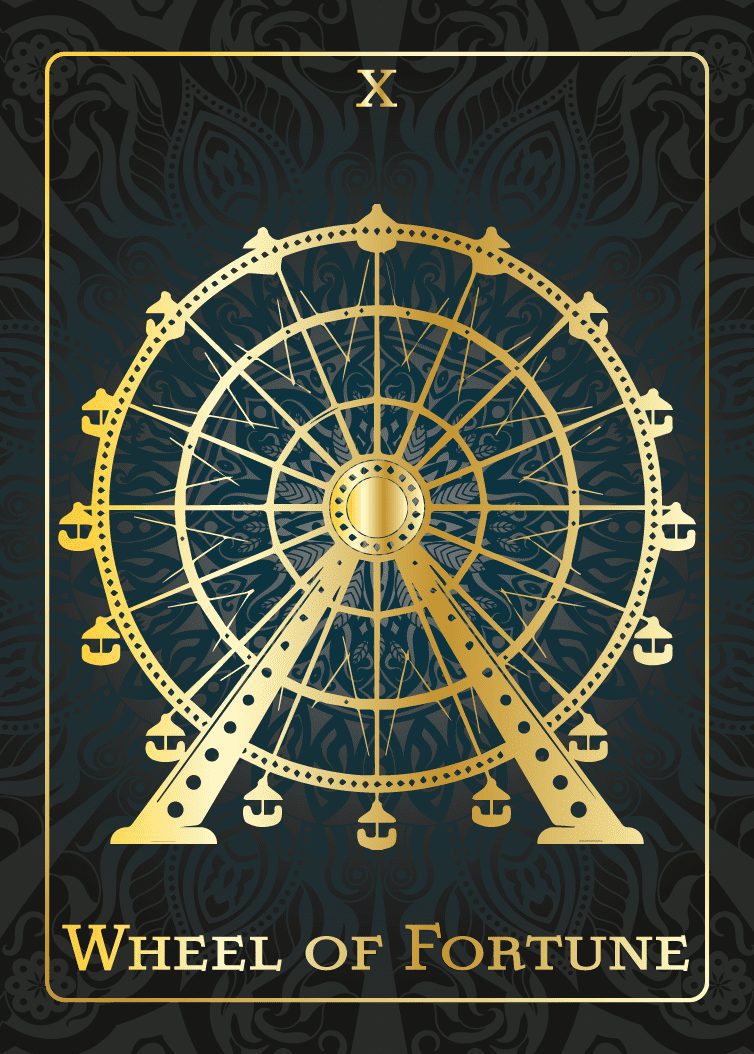
From out of hiding comes the Fool, into the sunlight, as if being pulled up from some low, dark point on a wheel. It is time for a change. She heads back to civilization, expecting nothing.
But, strangely, wonderful things seem to happen to her as the hours go by. Wandering by a carnival, a woman offers her a drink in a golden chalice, and then urges her to keep the cup; as she enjoys the refreshment she stops to watch a young apprentice swinging a sword; when she expresses her admiration of the weapon, the page presses it into her hand, insisting that she take it.
And finally, as she contemplates life and the Ferris Wheel taking its passengers up, down, up & back down again, a stranger joins her and hands her a bag of money. “I decided to give this to the tenth person I met today,” explains the Merchant, “You’re the tenth.” The Fool hardly thought she could still be surprised, but she is. It is as if everything good that she ever did in her life is being paid back to her, three-fold. All luck this day is hers.
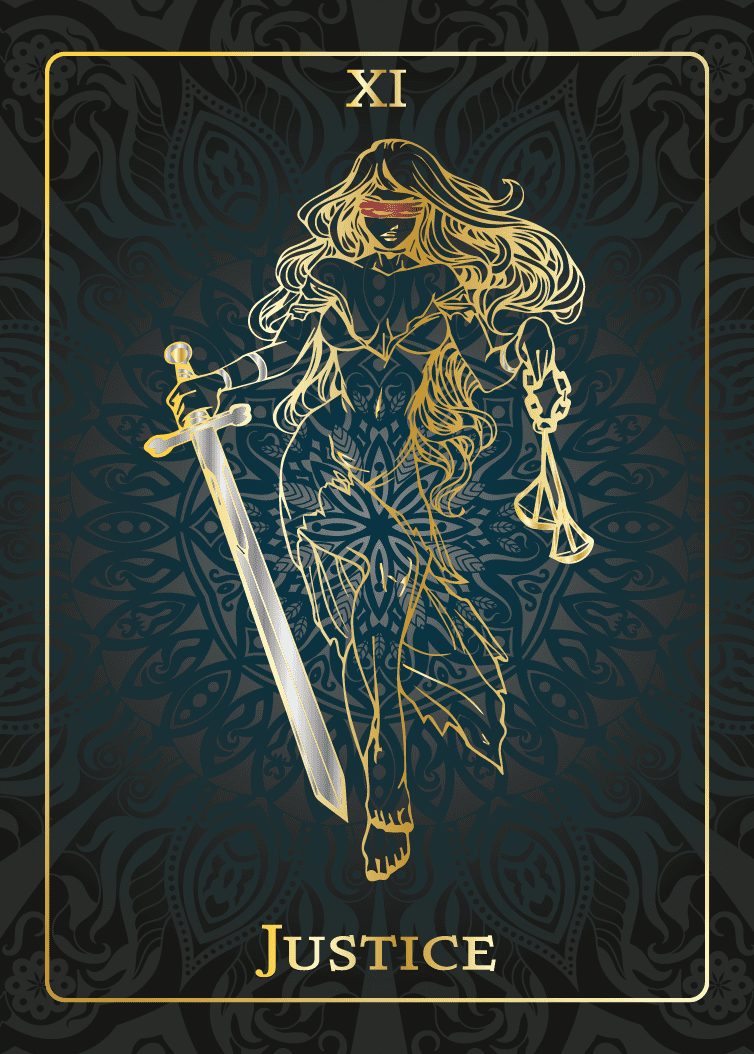
The Fool is looking for a new path, a new aspiration and inspiration for her life. Sitting uncertain at a crossroads she notices a blind wise woman listening to two brothers argue over an inheritance. They have come to her for judgment. One brother has the whole inheritance, the other has nothing.
“I ask that all of it be given to me,” the poor brother demands, “Not only because I have a better right to it, but because I will not be wasteful with it, as he is!” But the rich brother protests, “It is rightfully mine and that’s all that should matter, not what I do with it!”
The woman listens, then awards half of the rich brother’s inheritance to the poor brother. The Fool thinks this only fair, but neither brother is happy. The rich one hates losing half his wealth, and the poor one feels he ought to have gotten all.
“You were fair,” the Fool remarks to the woman after the brothers have left. “Yes, I was,” she answers plainly. “With only half the inheritance, the rich one will stop being so wasteful. And the poor one will have as much as he needs. Even though they cannot see it, this decision was good for both.”
The Fool thinks on this and realizes that she has spent her life achieving worldly ambitions and physical goods while leaving her spiritual self to starve. She ought to have given half her time and energy to her spiritual self, but she didn’t. It’s no wonder that she feels unbalanced. Thanking the woman, she heads out to restore equilibrium to her inner scales.
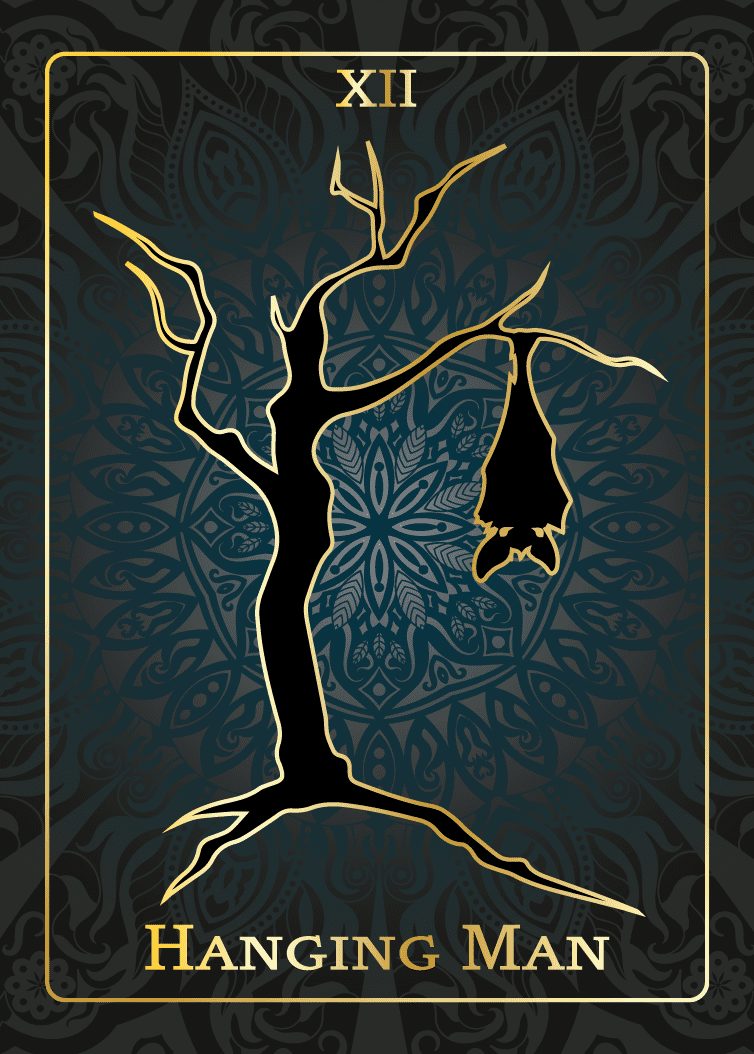
The Fool settles beneath a tree, intent on finding her spiritual self. There she stays for nine days, without eating, barely moving. People pass by her, animals, clouds, the wind, the rain, the stars, sun and moon. On the ninth day, with no conscious thought of why she climbs the tree and dangles from a branch upside down like a bat. For a moment, she surrenders all that she is, wants, knows or cares about. Coins fall from her pockets and as she gazes down on them – seeing them not as money but only as round bits of metal.
It seems to her that her perspective of the world has completely changed as if her inverted position has allowed her to dangle between the mundane world and the spiritual world, able to see both. It is a dazzling moment, dreamlike yet crystal clear.
Timeless as this moment of clarity seems she realizes that it will not last. Very soon, she must right herself, but when she does, things will be different. She will have to act on what she’s learned. For now, however, she just hangs, weightless as if underwater, observing, absorbing, seeing.
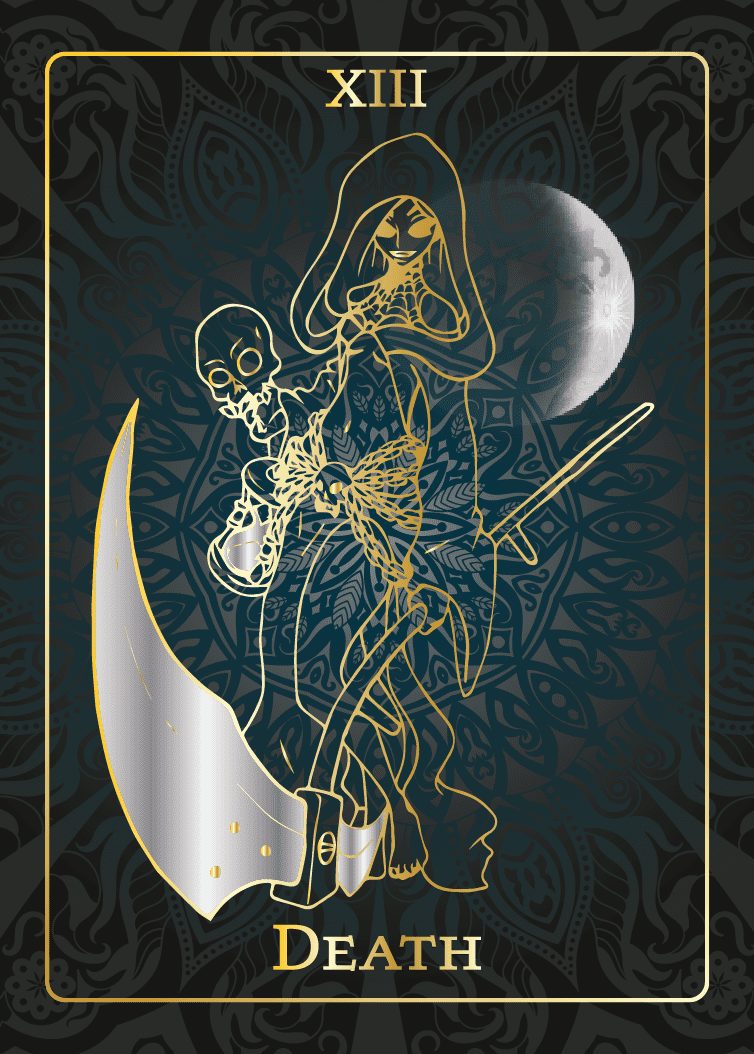
Having left the tree from where she hung, the Fool moves carefully through a fallow field, head still clearing from visions. The air is cold and wintry, the trees bare. She knows she has started on her spiritual journey in earnest but feels strangely empty and profoundly sad as if she has lost something.
Before long she sees, rising with the moon, a woman in a black cloak, an hourglass dangling from her belt and holding a skull in her hand. She recognizes her as Death. As Death stops before her, she humbly asks, “Have I died?” And Death answers, “Yes, in a way. You sacrificed your old world, your old self. Both are gone, dead.”
The Fool cannot keep from weeping. “Forgive me,” she says, embarrassed by her tears.
“There is nothing to forgive,” Death replies. “Mourning is natural and you must deal with your loss before you can accept anything new. Keep in mind, however, that old leaves must wither and fly away from a tree’s branches, leaving them bare, before new green leaves can appear.”
As Death continues unhindered, the Fool sees the truth in those words. Much like the skull Death carries, she as if all that she was is now stripped away. This, she understands, is how all great transformations start, by removing everything down to bare bone or soil so that something new has room to grow.
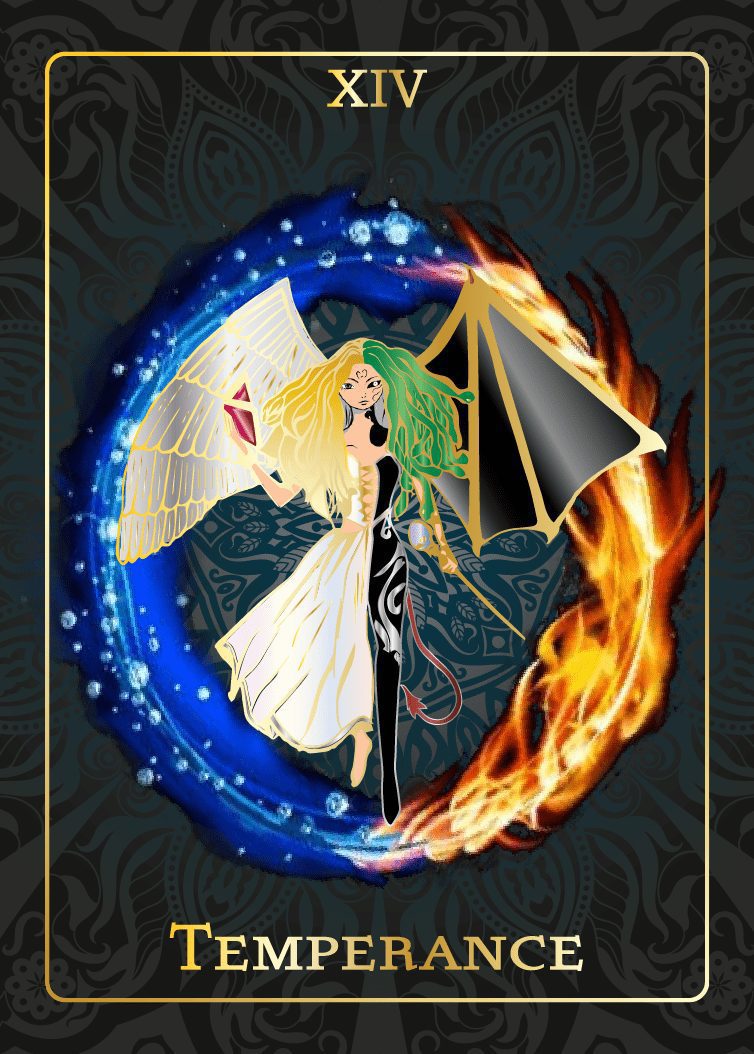
Recovering from feelings of loss at last, the Fool begins to wonder if she will finally find the new spirituality she’s after. It occurs to her that so far, she’s been dealing with opposites: the two opposing sides of the scales (Justice), the material and spiritual (which she hung between as the Hanged man), death and birth (the one leading into the other in the Death card). Does one always have to be surrendered to get the other? She wonders.
It is at this point that she comes upon a winged figure standing with one foot on the water, the other balanced on a flame. The radiant creature directs both the water and fire to move gracefully up and around her, dancing together in an unbroken ring. The two are being blended together into a completely different substance!
“How can you mix fire and water?” the Fool finally whispers. Never pausing the Angel answers, “You must cast the right spell and use the right intentions.”
The Fool watches with wonder. “Can this be done with all opposites?” she asks. “Indeed,” the Angel replies, “Any oppositions, fire and water, man and woman, thesis and anti-thesis, can be made into a unified third. It is only a lack of will and a disbelief in the possibility that keeps opposites, opposite.”
And that is when the Fool begins to understand that she is the one who is keeping her universe in twain, holding life/death, material world and spiritual world separate. In her, the two could merge. All it takes, the Fool realizes, is an understanding that all is one. Finding her ZERO point; she declares her intention to allow negative and positive as one. This is where magic begins.
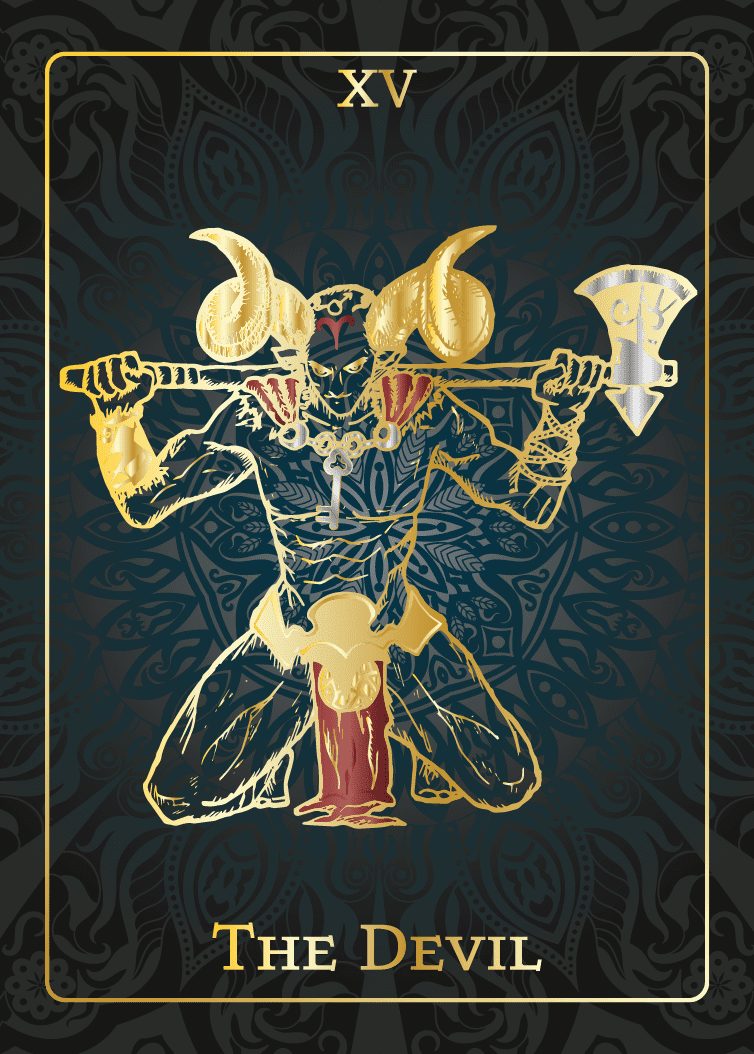
The Fool comes to the foot of an enormous black mountain where reigns a creature half goat, half god.
A key dangles from the front of the Devil’s cloak.
Before him naked people, linked to the god’s throne by chains, engage in every indulgence imaginable: sex, drugs, food, drink. The closer the Fool gets, the more she feels her own earthly desires rising in her. Carnal desires, hunger for food and power, greed and selfishness.
“I have given up all such desires!” she roars at the Goat god, resisting the beast’s power with all her might. She is sure that this is a test of her new spirituality, one where she must prove that the temptations of the material world cannot sway her.
The creature responds to her defiance with a curious look. “All I am doing is bringing out what is already in you,” it responds mildly. “Such feelings are nothing to fear, nothing to be ashamed of, or even to avoid. They are even useful to help you in your quest for spirituality, though many try to pretend otherwise.”
The Fool gestures angrily at the chained men and women, “You say that – even though these are clearly enslaved! Why do you not use your key to unlock their chains?”
The Goat-god mimics the Fool’s gesture. “Take another look.” The Fool does so, and realizes that the chained collars the men and women wear are wide enough for them to easily slip off over their heads. “They can be free if they wish to be,” the Goat-god says, “They remain here because they want to be controlled by their base, bestial desires. There are, however, others…”
At this, the Goat-god gestures upward, toward the peak of a mountain. “…Others who have used my key to unchain their deepest impulses. They use the resulting power to fuel a climb to the highest heights. If they had denied their desires they’d never have gotten there.”
On hearing this, the Fool sees that she has mistaken the Goat-god. This is not a creature of evil as she thought, but of great power, the lowest and the highest, both of beast and god. Like all power, it is frightening, and dangerous…but he freely offers the key to freedom and transcendence to all brave enough to come near where he kneels.
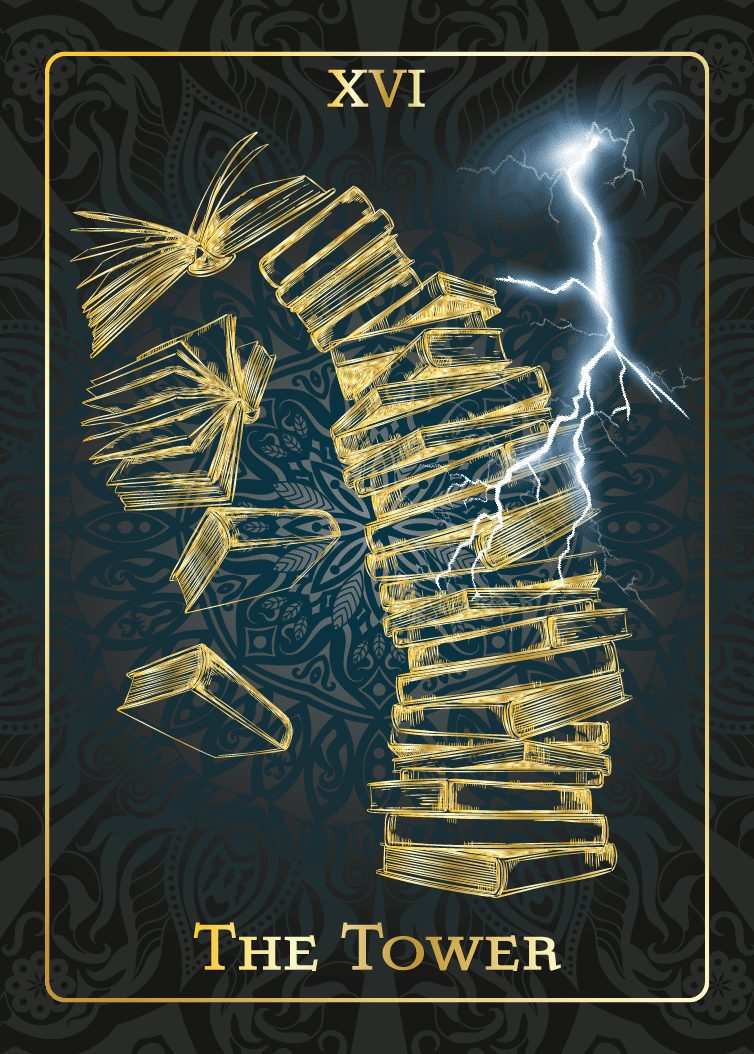
As the Fool leaves the throne of the Goat God, she comes upon a Tower, fantastic, magnificent, and familiar. In fact, The Fool, herself, helped build this Tower of knowledge back when the most important thing to her was making her mark on the academic world and proving herself better than others. Inside the books of The Tower, arrogant men still argue theory, convinced of their rightness.
Seeing the Tower again, the Fool feels as if lightning has just flashed across her mind; she thought she’d left that old self behind when she started on this spiritual journey. But she realizes now that she hasn’t. She’s been seeing herself, like the Tower and the men who carry on the arguments, as alone and singular and superior, when in fact, she is no such thing.
So captured is she by the shock of this insight, that she opens her mouth and releases a SHOUT! And to her astonishment and terror, a bolt of actual lightning slashes down from the heavens striking the Tower and sending its volumes leaping and tumbling to the ground below.
In a moment, it is over. The Tower and all its arguments are toppled. Torn papers blow away in the wind. Stunned and shaken to the core, the Fool experiences profound fear and disbelief. But also, a strange clarity of vision, as if her inner eye has finally opened. She tore down her resistance to change and sacrifice (Hanged man), then came to terms with Death (Death); she learned about moderation and synthesis (Temperance) and about power (The Devil). But here and now, she has done what was hardest: she destroyed the pride and lies of her life. What’s left are foundations on which she can rebuild herself.
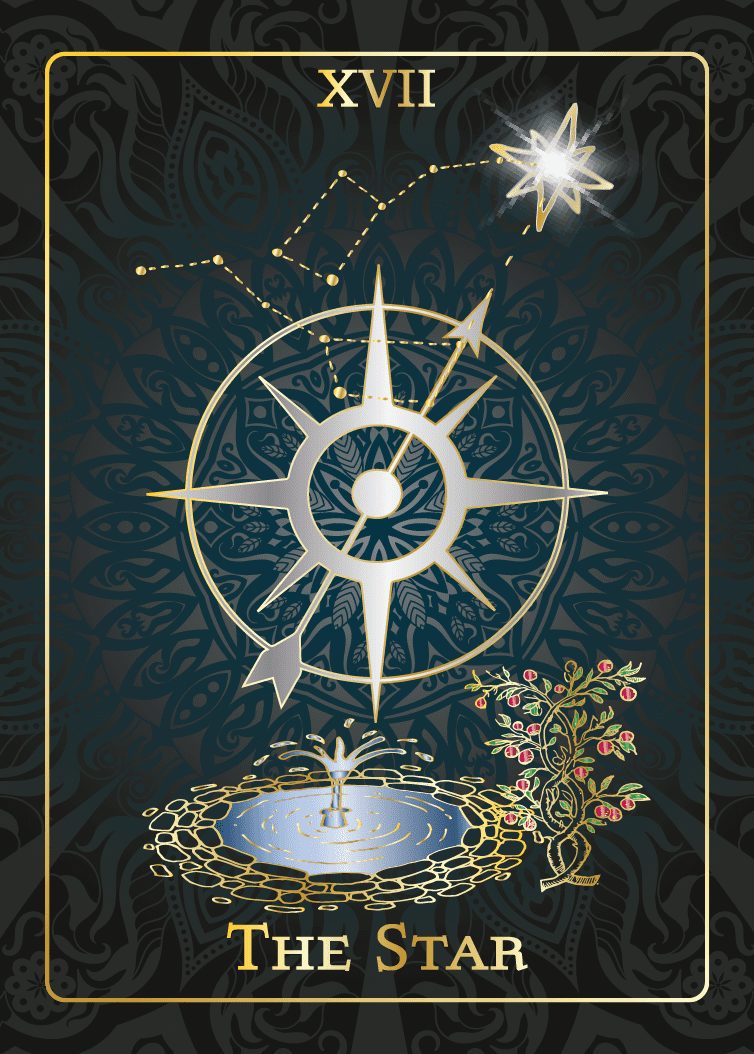
On the bleak landscape where the Tower stood, the Fool sits, empty, despairing. She hoped to find direction on this spiritual journey, a path to her spiritual self, but having just learned that most of her life was a lie, she now feels lost. Sitting on the cold stones, she gazes up at the night sky wishing for some kind of guide. Her eye is drawn to a bright star above.
“What are you doing?,” The Fool asks herself. To her surprise, the Star answers. “I am lighting the way to this pool, so that those who are thirsty may drink.” A single fruit tree stood near the pool, a nightingale singing amid its branches.
“Come,” she invites. “Sate your hunger and quench your thirst.”
The Fool plucks some fruit from the tree, then kneels and drinks from the pool. The water tastes wonderful, like liquid starlight, and the fruit is equally delicious. Both help to heal her wounded heart.
Having quenched her thirst and sated her hunger, the Fool lays back to gaze up at the Star. “You are so beautiful,” she said, “but so distant.”
“Like all possible futures,” agrees the Star. “Cool and distant. Yet if you keep me in sight, I can guide you to your destination no matter how far away it is.” Even as she says this, her voice begins to fade away, like dew, vanishing. “Follow your star,” the woman’s voice seems to sing from starlight, “and have hope.”
The Fool takes in a breath and rises. It is a dark night, a desolate land. But for the first time, she has a guiding light to show him the way. Distant as it is, it restores her faith.
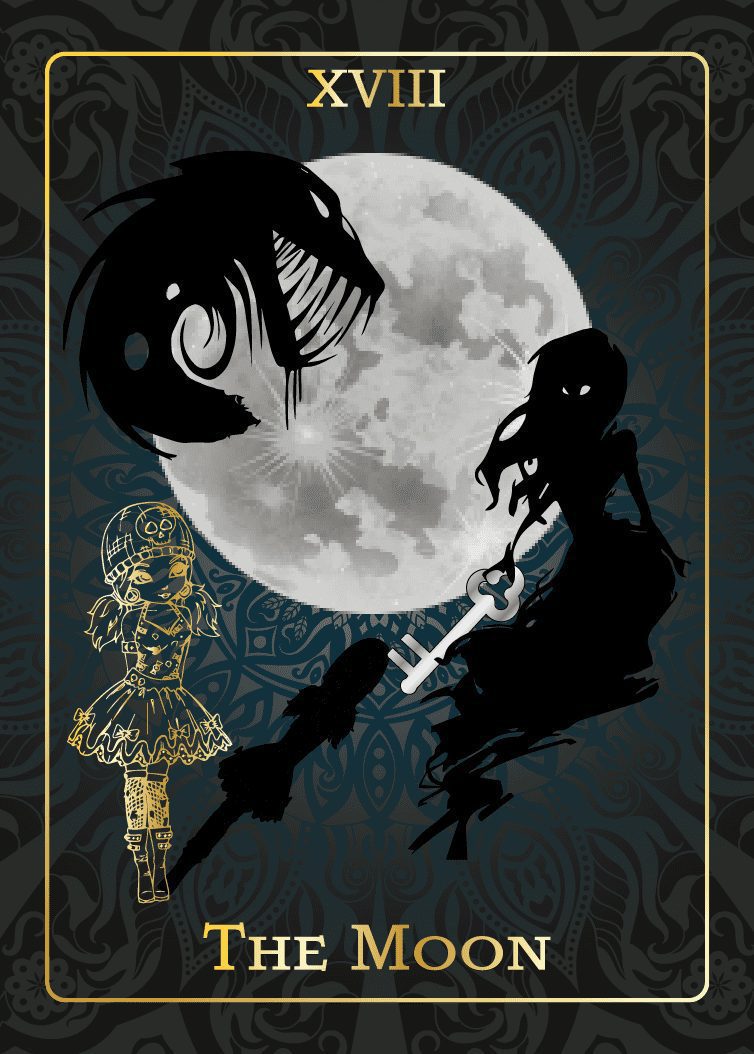
Following the star, the Fool travels through the night. The full Moon rises, illuminating her shadow as she walks. She begins to feel disoriented as if walking in her sleep. Suddenly, she looks around to find herself in another land entirely, a land of shadows against the moonlight. When she was in the presence of the High Priestess, she saw hints of this dark land through the visions induced by meditating on the seasons of life, to the ticking of the clock. And later, when she hung from the tree, she felt herself between the physical world and this one. Now, she has at last passed behind the veil.
Here are the mysteries she sought, the darkest mysteries, ones that have to do with the most primal and ancient powers. It is land poets, artists, musicians and madmen know well, a terrifying, alluring place, with very different rules. Creatures from childhood nightmares and fantasies peer from shadows, eyes glowing. Some hold keys to deeper knowledge, offering them to brave young girls who have learned to tame demons.
The Fool realizes she has only two choices. She can lose herself in this desolate, primal land of madness and illusion, or she can reach for the key and trust for a result. The moon will be in control either way. With a key in hand, she can unlock the powers of her unconscious will.
Inspiration, visions, and genius are the rewards of such surrender to the Moon’s Magic, as artists, poets and seers know. As she bravely steps forward moonbeams light her path and she feels the Mistress of this dark land gazing down at her with the High Priestess’s approving eyes.
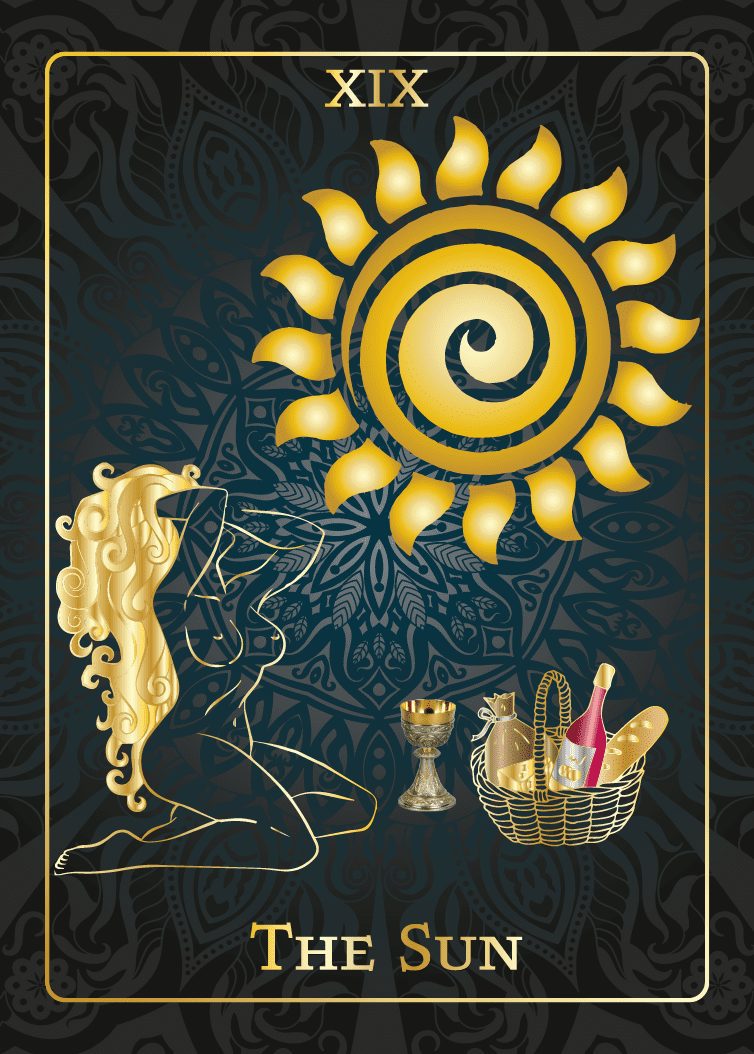
The Fool wakes at dawn from her long, dark night of the soul to find an open garden dominated by roses, lilies, and splendid, nodding sunflowers. She watches the sunrise overhead. The day is clear. A woman’s laughter attracts the Fool’s attention and she sees her, naked and free, warming her skin in the Sun, hair reflecting its rays without a care in the world; abundant wine and food sit in a basket before her.
The Fool stops, blinking up at the Sun so large and golden overhead, and she finds herself smiling, wider and brighter than she has in a very long time. She has been tested and tried, confused and scared, dismayed, and amazed. But this is the first time that she has been simply and purely happy. Her mind feels illuminated, her soul light and bright as a sunbeam. The Fool sees the world and herself anew.
“Who are you?” the Fool asks the woman at last. The woman smiles at this and seems to shine. And then she grows brighter and brighter until she turns into pure sunlight.
“I’m Your inner light,” the woman’s voice seems to come from everywhere and nowhere, “The new you.” And as the words fill the Fool with warmth and energy, she comes to realize that this garden this woman, the sun above, all exist within her. She has just met her own inner light.
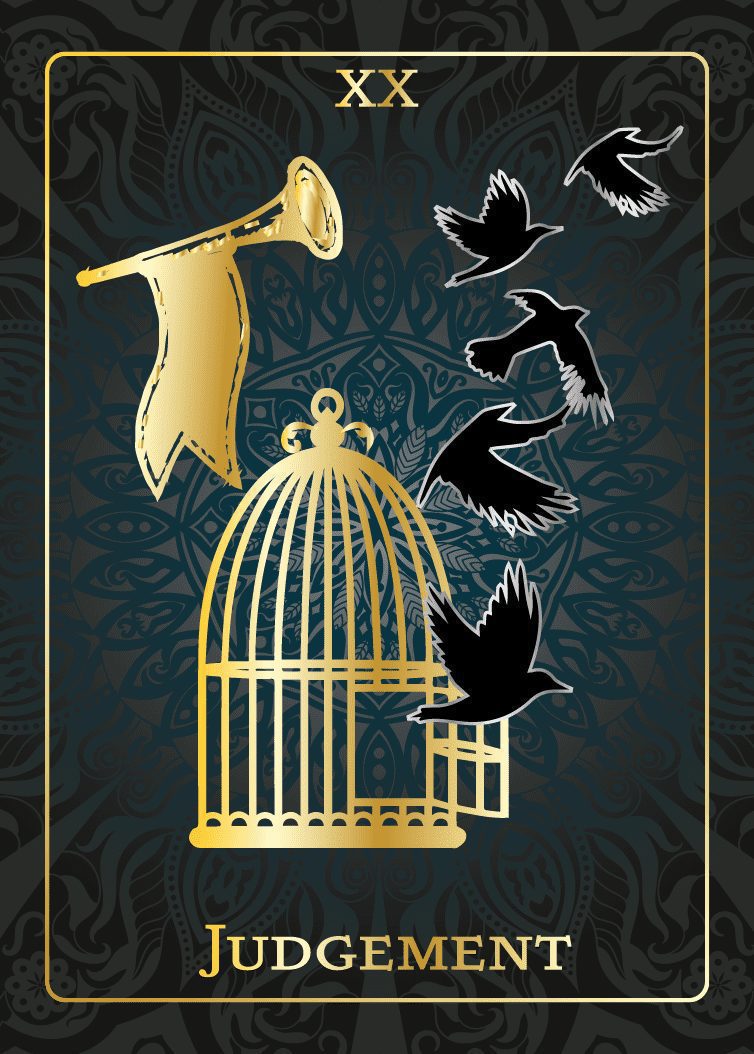
As the Fool leaves the garden of the Sun, she feels that she is near the end of her journey, ready to take a final step. But something is keeping her from doing this, holding her back. She gazes up, hoping to find guidance from the Sun; instead, she sees above her a fiery herald, beautiful and terrible.
“You are right,” the herald figure confirms, “you have only one last step on your journey, one final step to completion. But you cannot take that step until you lay your past to rest.”
The Fool is perturbed. “Lay it to rest? I thought I’d left it behind, all of it!”
“There is no way to leave the past behind,” The herald observes. “Each step wears down the shoe just a bit, and so shapes the next step you take, and the next and the next. Your past is always under your feet. You cannot hide from it, run from it, or rid yourself of it. But you can call it up, and come to terms with it. Are you willing to do that?”
The herald hands the Fool a small trumpet. The Fool is hesitant, but she knows that the herald is right. There are certain memories she has a hard time looking back on as they make her feel guilty, ashamed, angry. She knows that she’s never come to terms with what happened and she must if she wants to make that final transition.
She blows the trumpet and a golden cage appears. It becomes clear that the fool herself has kept this cage locked, trying to hide away her past. She now knows what the key she acquired from the dark mistress of the moon is for; she unlocks the door and the spirits of her past selves fly free, including those less than admirable past selves that she’s tried to forget.
For the first time, she faces them. They are, she sees, nothing to fear. They were her once-upon-a-time, but not now. Even as she realizes this, she finds herself forgiving those past selves for the wrongs they did that left her feeling bad. She senses, in turn, that they forgive her for ignoring the lessons they had to teach her. As she reaches an understanding with them, they start to fly away, vanishing into the sky. Though they remain as experiences and memories, they no longer have any power over her. She is free of ill-feelings, reborn, and living in the present.
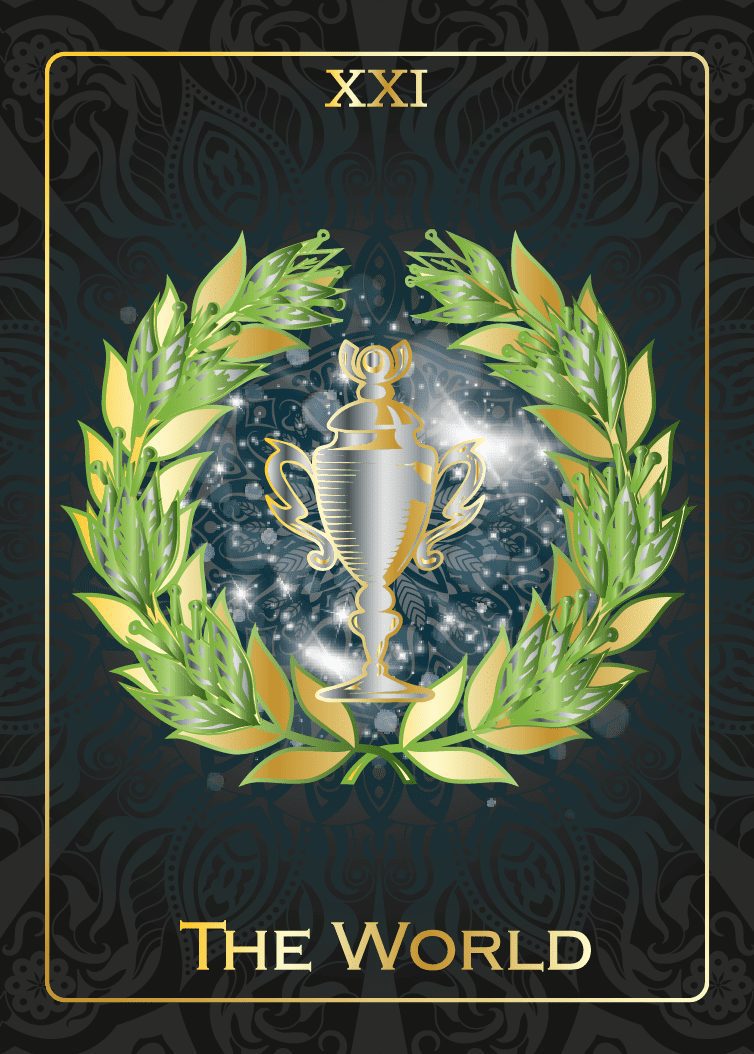
The Fool turns to take that final step along her final path, and finds, to her bemusement, that she is right back where she started, in the very same place she almost tripped over her pack when she was young and too foolish to look where she was going.
But now she sees her position very differently. She thought she could separate body and mind, learn all about one, then leave it behind to learn about the other. But in the end, it is all about the self; mind and body, past and future, the individual, and the world.
With a knowing smile, the Fool makes what looks like a stumbling step but is the beginning of a joyous leap…and soars. Higher and higher, until the whole of the world is hers to see. And there she dances, surrounded by a yoni of stars, at one with the universe. Ending, in a sense, where she began, beginning again at the end. The world turns, and the Fool’s journey is complete.
